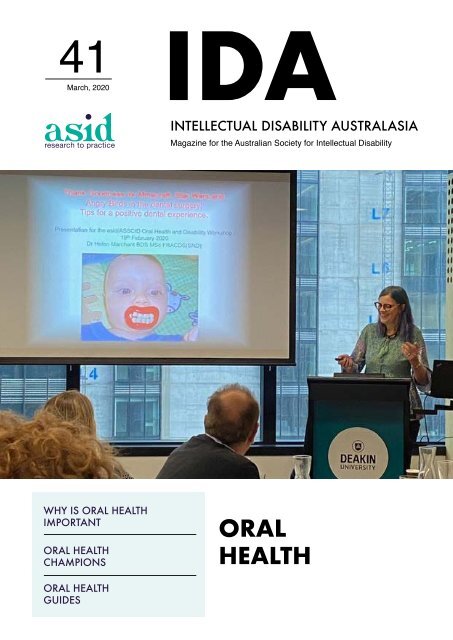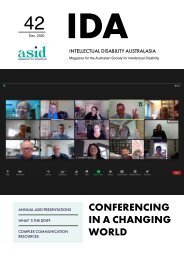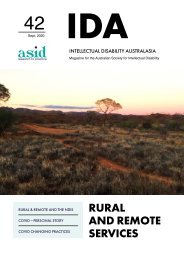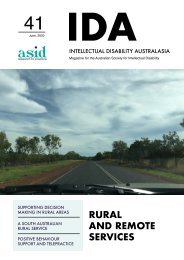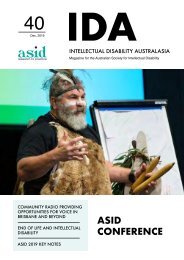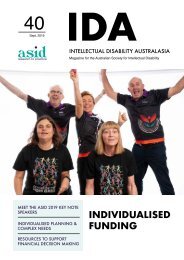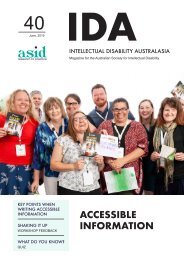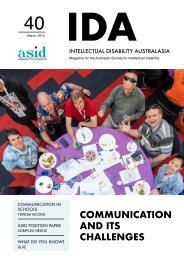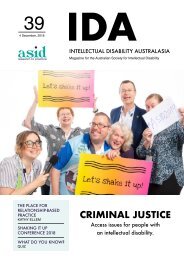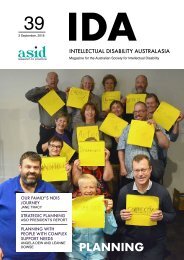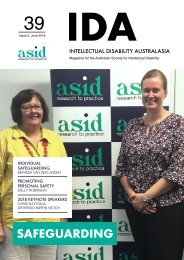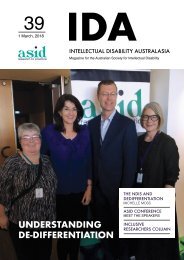IDA Volume 41 Issue 1 March 2020 (Mar 2020)
Create successful ePaper yourself
Turn your PDF publications into a flip-book with our unique Google optimized e-Paper software.
<strong>41</strong><br />
<strong><strong>Mar</strong>ch</strong>, <strong>2020</strong><br />
<strong>IDA</strong><br />
INTELLECTUAL DISABILITY AUSTRALASIA<br />
Magazine for the Australian Society for Intellectual Disability<br />
WHY IS ORAL HEALTH<br />
IMPORTANT<br />
ORAL HEALTH<br />
CHAMPIONS<br />
ORAL<br />
HEALTH<br />
ORAL HEALTH<br />
GUIDES
Hilary Johnson<br />
<strong>IDA</strong> Editor<br />
Welcome to<br />
the <strong><strong>Mar</strong>ch</strong><br />
edition of <strong>IDA</strong><br />
Magazine<br />
It was slow and sad start to the year with bushfires and floods taking a<br />
lot of members energies and we wish them the best to get through the<br />
coming year. It’s a brand new year and the first edition of <strong>IDA</strong> is ready<br />
to go. We are starting the year with a focus on oral health. Oral health<br />
is often rated low in priority yet it is vital for our overall health (page 5).<br />
The Victorian ASID committee co-hosted an oral health seminar with<br />
representatives from the Australian Society of Special Care in Dentistry<br />
and Deakin University and the cover page shows Dr Helen <strong><strong>Mar</strong>ch</strong>ant<br />
one of the dentists presenting at the forum. For further information<br />
see the report (page 16), and oral health resources that have been<br />
developed (www.inclusionmelbourne.org.au/projects/your-dentalhealth).<br />
Check out the submission presented at the Royal commission<br />
hearings too (page 11). In addition, this edition features a paper some<br />
of you might have been lucky to attend at our last ASID conference<br />
(page 7). The project highlights what can be done in a sustainable<br />
way to ensure people with intellectual disability have good oral health.<br />
You might even pick up some tips to make cleaning your teeth more<br />
enjoyable!<br />
Many Australians have put in submissions to the Royal Commission<br />
regarding the health of people with an intellectual disability. You<br />
might like to visit the website to follow some of the submissions www.<br />
disability.royalcommission.gov.au and the outcomes. <strong>IDA</strong> will continue<br />
to follow the royal commission and highlight issues of interest to people<br />
with an intellectual disability. The Commission will be examining access<br />
and participation for people with cognitive disability that is a disability<br />
that maybe characterised by intellectual disability, autism, acquired<br />
brain injuryor dementia. In 2018 there were over 900,000 people with<br />
cognitive disability in Australia.<br />
It’s been a bit quiet around the divisions but WA have put in a report<br />
from a dedifferentiation seminar held last year. Don’t forget to check<br />
out ASID’s dedifferentiation position statement. www.asid.asn.au/<br />
files/1479_dedifferentiation_position_statement.pdf<br />
Meet another of ASID’s eminent researchers, Bernadette Curryer –<br />
also an ASID board member. Check out her photo to see her favourite<br />
drinks. Do you know anyone with a good story – maybe a person with<br />
an intellectual disability who did something interesting? A staff member<br />
who won an award?<br />
Arrangements for the next ASID conference in Auckland, New Zealand<br />
in November are unfolding and you can meet the organising committee<br />
(page 22). We also have our regular features including the NSW<br />
inclusive researchers reflecting on their time at the ASID conference<br />
in South Australia (page 25). The next edition for this year will be in<br />
late June and will contain articles on the theme of “Rural and remote”.<br />
What is your organisation doing – How to do we make improvements<br />
to services? See the back page of <strong>IDA</strong> for more details of sending in an<br />
article or just email me with any questions (page 33).<br />
2 www.asid.asn.au<br />
• idaeditor@asid.asn.au
VOLUME <strong>41</strong>, ISSUE 1, MARCH <strong>2020</strong><br />
Contents<br />
Editorial<br />
President’s Report<br />
Everyone has a ‘voice’ in achieving better outcomes in<br />
oral health for people with an intellectual disability<br />
genU Oral Health Champions<br />
Oral Health and Intellectual Disability: Leading the way in<br />
advocacy and resource development<br />
Oral Health and Intellectual Disability<br />
2<br />
4<br />
5<br />
7<br />
11<br />
16<br />
Division Report<br />
Victoria<br />
Western Australia<br />
Queensland<br />
De-differentiation: What Does That Mean?<br />
ASID Conference <strong>2020</strong><br />
19<br />
20<br />
20<br />
21<br />
22<br />
Research Profiles<br />
Bernadette Curryer<br />
Inclusive Researchers Column<br />
23<br />
25<br />
Community Corner<br />
Quiz<br />
Why Join ASID?<br />
ASID Committees<br />
Writing an Article for <strong>IDA</strong><br />
Why Advertise with ASID?<br />
27<br />
29<br />
31<br />
32<br />
33<br />
Vol <strong>41</strong>, <strong>Issue</strong> 1, <strong><strong>Mar</strong>ch</strong> <strong>2020</strong><br />
3
PRESIDENT’S REPORT<br />
As we enter <strong>2020</strong>, across Australia and Aotearoa New Zealand the way disability services are<br />
funded, structured and delivered continue to be overhauled at record speed with the National<br />
Disability Insurance Scheme in Australia and Mana Whaikaha in Aotearoa New Zealand.<br />
This coupled with two significant inquiries into the treatment of people with disability with the Royal<br />
Commission into Violence, Abuse, Neglect and Exploitation of People with Disability in Australia and<br />
the Abuse in Care Royal Commission of Inquiry for New Zealand, represented an unprecedented<br />
focus on the disability sector.<br />
ASID is acutely aware that now more than ever it is important that the voices of people with<br />
intellectual disability are heard and we advocate for evidence to be put into practice. It has not gone<br />
without notice that many of our members and stakeholders have participated in the hearings of both<br />
Commissions and we champion their ongoing participation. In 2019, we formed a Board Committee,<br />
chaired by Professor Christine Bigby to focus on ASID’s contribution to the Commissions, work will<br />
continue with this into <strong>2020</strong>.<br />
February marked the first Board of Directors meeting for <strong>2020</strong>. It was an opportunity for Board<br />
Committees to present on their work plans for the year. It is pleasing to see a common theme of<br />
seeking to understand the needs of key stakeholders across many areas of our business including<br />
our journals, events, broader communication strategies, inclusion and the work of divisions.<br />
This is complimented by a strategic shift to focus on, manage and mitigate risk across our<br />
organisation, an important part of future proofing ASID.<br />
It is incredible that this is my third year as President of ASID, the past two years have simply flown<br />
by. As part of seeking to understand the needs of our key stakeholders, one opportunity I look<br />
forward to over the next few months is connecting with each ASID Division. There is great diversity<br />
within and between our Divisions. This is both a strength and a challenge for our organisation.<br />
Through meeting with Divisions, I hope to gain a better<br />
understanding of local membership, priorities and identified<br />
needs, which will in turn will inform the overarching direction<br />
of ASID across <strong>2020</strong>.<br />
As always, I would welcome any feedback or comments from<br />
the readers of <strong>IDA</strong>. Please feel free to email me anytime at<br />
president@asid.asn.au.<br />
Laura Hogan<br />
<strong>2020</strong> ASID President<br />
president@asid.asn.au<br />
4 www.asid.asn.au
EVERYONE HAS A ‘VOICE’ IN ACHIEVING<br />
BETTER OUTCOMES IN ORAL HEALTH FOR<br />
PEOPLE WITH AN INTELLECTUAL DISABILITY<br />
Richard Zylan<br />
The Oral Health of individuals with an intellectual disability is not only important from the traditional ‘healthy<br />
mouth’ perspective but has also been clearly linked to the overall health of the individual. Poor oral health<br />
has not only been associated with dental decay, mouth abscesses and inflammation of the gums but has<br />
also been linked to gum disease (periodontitis), cardiovascular disease, and diabetes (Watanabe, 2011).<br />
For patients with an intellectual disability who often face greater barriers accessing dental care due to<br />
issues such as finances, transport, planning, and available supports -poor oral health can have even a<br />
far greater impact on their quality of life. This can be seen in them developing a range of nutritional and<br />
digestive disorders. A greater incidence of tooth extraction can lead to difficulty in chewing and digestion<br />
often leading to an increased consumption of refined sugar leading to obesity or constipation. Difficulty with<br />
swallowing and breathing can also result in aspirational pneumonia when oral health is poor.<br />
These conditions should not be considered inevitable for people with an intellectual disability who have the<br />
same right as everyone else to being ‘optimally healthy’.<br />
So, what can be done to help prevent this?<br />
This can be viewed from the lenses of home care, support for attending dental appointments and<br />
communication and collaboration with patients, families, dentists and other medical professionals.<br />
Home Care:<br />
Dental decay and gum disease need to be considered a chronic disease - kind of like the way we view<br />
diabetes (Sievers, Silk, Quinonez & Clark, 2010). You don’t go to the doctor and get cured in a single visit<br />
from diabetes. It is the same way for decay and gum disease – having a dentist clean your teeth or place a<br />
filing won’t stop the decay or gum disease from coming back.<br />
But making sure teeth and gums are cleaned as best as possible everyday will go a long way to helping<br />
keep mouth issues at bay – especially if combined with a sensible diet.<br />
It is also important for individuals themselves, parents and support workers to keep an eye out for red flags<br />
for dental problems, which include:<br />
● Red or bleeding gums ● Bad breath<br />
● Thrush<br />
● Holes or black teeth<br />
● Ulcers<br />
● Behavioural changes<br />
● Grinding<br />
Most importantly (and particularly for people with an intellectual disability residing in group homes) an<br />
annual oral health assessment or check up is vital. Quick tip – if you need specific assistance at the<br />
dentist with access, or if too feel comfortable you need a weighted blanket, particular music or a child would<br />
like to bring a special toy – the ring the dental clinic and let them know – they will be only to happy to help.<br />
Vol <strong>41</strong>, <strong>Issue</strong> 1, <strong><strong>Mar</strong>ch</strong> <strong>2020</strong><br />
5
EVERYONE HAS A ‘VOICE’ IN ACHIEVING BETTER OUTCOMES IN ORAL HEALTH<br />
FOR PEOPLE WITH AN INTELLECTUAL DISABILITY<br />
Support:<br />
People with an intellectual disability sometimes due to financial limitations must even choose between<br />
seeking dental care or more general medical care. When they can access dental care it requires having<br />
carers or support workers who are not overwhelmed with care needs and who appreciate the importance of<br />
oral health.<br />
Carers and support workers need to convey relative information (such as oral red flags noticed at home) to<br />
the dentist, help support the person with an intellectual disability – which may sometimes even necessitate<br />
several visits to desensitise them to the dental setting. Sometimes this might mean multiple visits where the<br />
patient first sits in the waiting room, then the dental chair, then opens their mouth, then lets someone look<br />
inside – often only after several ‘becoming comfortable’ visits first.<br />
Carers and support workers also need to be able to gather and relay relative dental information back to<br />
families, or key workers so that decisions regarding the best outcomes for oral health can be made in<br />
a supported fashion. Importantly – any oral care instructions provided by the dentist need to be taken<br />
home in writing so that they may be incorporated into any support or medical health plans (remember the<br />
importance of daily care from above!).<br />
Collaboration with patients, families, dentists and other medical professionals.<br />
Collaboration and communication are the KEY here – with everyone involved with providing care or<br />
supporting the person with an intellectual disability needing to be aware of the importance of personcentred<br />
care and impact of culture, behavioural issues and living arrangements – and understanding<br />
their role and the role of others in providing care as part of an interprofessional approach (Despott, Tracy,<br />
Shnider, 2019).<br />
Family members, cares and support workers can frequently monitor oral health red flags or any behavioural<br />
changes that might indicate mouth pain. People with intellectual disabilities are significantly more present<br />
at general medical practitioner (GP) offices than at dental offices – so having an oral health plan embedded<br />
as part of an overall health plan is important -so that the GP can also monitor the effect of oral health on<br />
overall health.<br />
This means that having an established oral health plan, such as the planning tool found in the Oral<br />
Health and Intellectual Disability Guide, which can be found at the Your Dental Health website<br />
(https://inclusionmelbourne.org.au/projects/your-dental-health/) can ensure that necessary or urgent<br />
treatment is provided on time.<br />
But most importantly – these tools allow everyone to be involved<br />
in providing optimal oral health care while allowing the person with<br />
an intellectual disability to have a “voice” in cooperative treatment<br />
planning and stress free (hopefully) dental treatment.<br />
References<br />
Sievers,K., Silk,H., Quinonez R.B. & Clark M. (2010). The relationship<br />
of Oral to Systemic Health, Smiles for Life: A National Oral<br />
HealthCurriculum, STFM Group (2014 version)<br />
Watanabe, K. (2011). Periodontitis in Diabetics: Is Collaboration<br />
between Physicians and Dentists Needed ? Dis. Mon, 57 (4):206-213.<br />
Zylan, R., Despott N., Tracy J. & Shnider W. (2019). Oral Health and<br />
Intellectual Disability: A Guide for Dental Practitioners. Melbourne:<br />
Inclusion Melbourne.<br />
Dr Richard Zylan<br />
Dr Richard Zylan BDSc (Melb)<br />
FICCDE FPFA is a general<br />
dentist and a Vic committee<br />
member of ASID and ASSCID,<br />
a parent of a young man with an<br />
intellectual disability and a board<br />
member at Bayley House.<br />
richzylan@bigpond.com<br />
6 www.asid.asn.au
genU ORAL HEALTH CHAMPIONS<br />
<strong>Mar</strong>gery Pithouse<br />
Background<br />
genU is a Victorian based provider of a range of disability services including shared and respite living for<br />
people with a disability (the majority of whom have an intellectual disability). We provide 24 hour per day, 7<br />
day per week support to people in shared group homes. The Oral Health Champions program operates in<br />
the Shared and Respite Living division of genU.<br />
The partnership with Dental Health Services Victoria was established<br />
In 2015, Dental Health Services Victoria (DHSV) sought to partner with a disability service to investigate<br />
how to improve oral health outcomes for the people accessing supported living services. genU was chosen<br />
from a number of applicants via an Expression of Interest process.<br />
DHSV was working from the point of understanding that people with disability generally have poorer oral<br />
health than the general population. This was terrific timing because it had recently been discussed at genU<br />
that not all staff were well equipped to provide oral health support.<br />
A dentist from DHSV was invited along with the Health Promotion Project Officer to provide training to a<br />
group of approximately 80 residential support workers at an All of Staff Meeting. The training was around<br />
how to maintain a healthy mouth, teeth and gums, and included hints for healthy eating and drinking and<br />
for proper brushing. Educational materials were provided to each staff member.<br />
Discussions then continued about how we could further promote and embed good practice for our support<br />
staff and educate people we supported about healthy mouths and teeth.<br />
We talked about the fact that many people with an<br />
intellectual disability are frightened of attending the<br />
dentist, and of having their teeth brushed. This led<br />
directly to the idea of making a video to assist with<br />
the issue. DHSV funded and co-wrote with genU<br />
a video, entitled “Sally’s visit to the dentist”. This<br />
video was a co-production, filmed with a volunteer<br />
genU client and staff member as actors. Because it<br />
used real people in real situations, it has had highly<br />
positive feedback from people with disability, staff,<br />
and others. The video is being used to help other<br />
clients understand and feel more comfortable with<br />
dentist visits.<br />
Click here to watch the video<br />
What next – the Oral Health Champion emerged<br />
With the basics understood by current staff who had attended the original training delivered by the dentist,<br />
the question was then posed about how other staff and new staff would learn about the importance of<br />
Vol <strong>41</strong>, <strong>Issue</strong> 1, <strong><strong>Mar</strong>ch</strong> <strong>2020</strong><br />
7
genU ORAL HEALTH CHAMPIONS<br />
supporting people with their oral health. Just as importantly, how could we help to empower people with<br />
disabilities about managing their own oral health. genU came up with the idea for 2016 of having an Oral<br />
Health Champion in each house. Staff members were asked to volunteer for the role and lead the rest of<br />
the staff in each house around providing excellence in oral health care for residents.<br />
DHSV continued to support genU by providing the attention of a Health Promotion Officer to assist with the<br />
running of the program.<br />
The following model was decided upon:<br />
● One team member of staff to volunteer as the Oral Health Champion for each staff team (usually<br />
per house)<br />
● The Oral Health Champions would come together for a workshop four times per year, in Geelong<br />
home base for genU, and that the staff would be paid to attend each session. The workshop<br />
would be convened by the genU Shared and Respite Living Practice Advisor, with support from a<br />
DHSV Health Promotion Officer<br />
● The format of the workshops would be roughly divided up into two hour-long sessions – the first<br />
using the person centred tool “What’s working?/What’s not working?” regarding oral health and<br />
the roll out of information; and the second as an educational workshop<br />
● Healthy eating and drinking to be modelled at the workshops where a fresh fruit platter and no<br />
sugar, low salt foods offered, with water, in line with the actions for good oral health which staff<br />
had learned about<br />
Outcomes for the first two years<br />
Within the first twelve months of the Oral Health program we had worked together to create:<br />
● An opportunity for the majority of staff to learn about supporting good oral health<br />
● the educational video “Sally’s visit to the dentist”<br />
● a workplace policy for genU about Oral Health<br />
● a teeth-cleaning checklist – for residents or staff to maintain in order to check that teeth/dentures<br />
were being cleaned, and toothbrushes replaced regularly.<br />
In the next year we focussed on developing a “How I like to be supported” Duty Statement for each person<br />
we support to ensure that staff understand what is required to assist the person with their oral hygiene.<br />
Example<br />
Support Tasks/Duties that must be completed<br />
by a staff member:<br />
• In the morning and the evening let Susi know<br />
when it is time to brush her teeth in 10 minutes.<br />
• Remind her again in 2 minutes.<br />
• Do not rush Susi, and if she doesn’t come to her<br />
bathroom prompt her with her toothbrush.<br />
• Remember that music and fun at tooth brushing<br />
time is very important to ensure that Susi will<br />
successfully be able to brush<br />
• Susi can independently apply toothpaste and<br />
brush. She enjoys company in the bathroom<br />
and likes to be told she has done her teeth well.<br />
• Remind her to brush for at least 2 minutes.<br />
Essential support for Susi to brush her teeth<br />
How I like to be supported:<br />
I like plenty of warning that it is time to clean my teeth.<br />
Let me know at least 10 minutes before, and then<br />
again 2 minutes before.<br />
If I don’t come to the bathroom please bring my<br />
toothbrush to me to show me and I will understand<br />
and come with you.<br />
Please support me to turn on my music in the<br />
bathroom so that I can listen to a good song whilst I<br />
brush. Michael Buble songs are best<br />
I can brush my teeth well by myself – the dentist said<br />
so, but I like staff to stay with me and let me know that<br />
I am doing a good job.<br />
8 www.asid.asn.au
Major findings regarding What’s working/What’s not working<br />
Anecdotal evidence of progress towards improved oral health outcomes was gathered from the Oral Health<br />
Champions at each workshop.<br />
These included, but were not limited to the following:<br />
What’s working<br />
● using tick sheet in bathroom<br />
● staff prompting to brush twice a day<br />
● clients sometimes ask “can you watch me<br />
brush?”<br />
● tap water at dinner instead of cordial<br />
● denture care with soap and water<br />
● all duty statements done<br />
● all residents dental checks up to date<br />
● one resident reminding staff to brush teeth<br />
● some full support<br />
● one person allowing teeth to be brushed 3 times<br />
a week (from once a week)<br />
● purchase cordial way down<br />
● residents happy to do what the dentist says<br />
What’s not working<br />
● not all staff consistent or vigilant<br />
● staff not cleaning electric toothbrushes and<br />
replacing heads<br />
● resident back on Diet Coke, possibly staff not<br />
discouraging<br />
● staff still making bottles of cordial and putting it<br />
in the fridge/promoting<br />
● tried timers but not well received<br />
● resident with dementia is challenging<br />
● forget to brush some surfaces of teeth<br />
● only sometimes brushing twice a day<br />
● not cordial but replaced by cranberry juice.<br />
● one client buys Sprite every day<br />
● duty statements rushed<br />
● families don’t take paperwork with them to<br />
dental visits<br />
● people don’t bring oral hygiene tools (to respite)<br />
This feedback formed the basis for future discussions, resources required and approaches to be taken by<br />
the Oral Health Champions.<br />
At the end of the first year it was mutually agreed by the Oral Health Champions that the position should<br />
be a one year role, handed over to another team member in order that more staff could be educated, and<br />
more staff would take responsibility for supporting oral health outcomes. Now, we have had more than four<br />
years of Oral Health Champions trained and working within the teams. We have developed the Oral Health<br />
Champions agreement to clearly identify and recognise the important role of Oral Health Champions at<br />
genU.<br />
Dental Health Services Victoria web resources<br />
At the same time that the Oral Health Champions were growing and flourishing, Dental Health Services<br />
Victoria were working on a new website, Supporting Every Smile, developed for anyone who supports a<br />
person with a disability to care for their oral health. The Oral Health Champions were able to be consulted<br />
as this was developed, and use it since its development.<br />
https://everysmile.dhsv.org.au/<br />
The Oral Health Champions program continues to support people towards better oral health outcomes at<br />
genu. This paper was presented at The ASID Conference, November 2019, Adelaide.<br />
Vol <strong>41</strong>, <strong>Issue</strong> 1, <strong><strong>Mar</strong>ch</strong> <strong>2020</strong><br />
9
genU ORAL HEALTH CHAMPIONS<br />
Bonnie Morrison, Health Promotion Officer, Dental Health<br />
Services Victoria<br />
<strong>Mar</strong>gery Pithouse, Practice Advice Manager, genU<br />
Sally Pickering, participant at genU<br />
Matthew Sayle, Team Leader at Sally’s home with genU<br />
References and further reading:<br />
https://everysmile.dhsv.org.au/<br />
Anders PL, Davis EL. Oral health of patients with intellectual<br />
disabilities: a systematic review. Spec Care Dentist. 2010;30(3):110–7.<br />
<strong>Mar</strong>gery Pithouse<br />
Practice Advice Manager<br />
Shared and Respite Living<br />
• margery.pithouse@genu.org.au<br />
10 www.asid.asn.au
ORAL HEALTH AND INTELLECTUAL DISABILITY:<br />
LEADING THE WAY IN ADVOCACY AND<br />
RESOURCE DEVELOPMENT<br />
Nathan Despott<br />
Inclusion Melbourne, the Centre for Developmental Disability Health (CDDH, Monash Health) and the<br />
Australian Society for Special Care in Dentistry (ASSCID), along with individuals from across the allied<br />
health sector have recently developed the Oral Health and Intellectual Disability Guide. This Guide<br />
outlines key protocols and recommendations for family members, health professionals and support workers<br />
to use in achieving optimal oral health outcomes for people with an intellectual disability and had been<br />
endorsed by the Australian Dental Association (ADA).<br />
The Your Dental Health team through their work in producing this guide have highlighted that<br />
interdisciplinary collaboration combined with a modest amount of disability knowledge are key components<br />
in removing barriers and improving oral health outcomes for people with an intellectual disability.<br />
The team’s work also led to a collaborative project with the Disability and Oral Health Collaboration, an<br />
interdisciplinary community instigated by Deakin University.<br />
The Your Dental Health project’s work now includes articles in the Victorian and Federal editions of the<br />
Australian Dental Association’s journals, a feature in the Bite Magazine for Australian dentists, and an<br />
interview in the Dental Tribune. The project’s key publications include:<br />
Your Dental Health:<br />
A Guide for People with a<br />
Disability, their Family Carers,<br />
Friends and Advocates<br />
Oral Health and Intellectual<br />
Disability:<br />
A Guide for Dental Practitioners.<br />
Your Dental Health website:<br />
An online resource containing<br />
the above publications and a<br />
suite of videos, including short<br />
videos that can be shown to<br />
people with disability before<br />
treatment to aid familiarisation<br />
and desensitisation, autismfriendly<br />
animations, and a<br />
pathway video produced in<br />
partnership with Monash Health<br />
for dentists illustrating the<br />
ways in which they can work<br />
collaboratively with disability<br />
support professionals during<br />
treatment planning.<br />
Vol <strong>41</strong>, <strong>Issue</strong> 1, <strong><strong>Mar</strong>ch</strong> <strong>2020</strong><br />
11
ORAL HEALTH AND INTELLECTUAL DISABILITY: LEADING THE WAY IN ADVOCACY<br />
AND RESOURCE DEVELOPMENT<br />
The focal point of the Your Dental Health project is the treatment pathway, available on pages 8-9 of Oral<br />
Health and Intellectual Disability (2019). The pathway promotes interaction at each point of the journey,<br />
from preparation and appointment planning, through to familiarisation, in-chair treatment, and posttreatment<br />
home care. This interdisciplinary pathway acknowledges the skills of well-trained direct support<br />
workers, rules relating to restrictive practices, the systems that exist in most group homes, the potential of<br />
general dentists, and the power of simple but effective post-treatment planning.<br />
The Your Dental Health’s collaboration with the Disability and Oral Health Collaboration saw the production<br />
of a joint submission to the Royal Commission into Violence, Abuse, Neglect and Exploitation of People<br />
with Disability. This unprecedented joint project of Deakin University, University of Melbourne, the Australian<br />
Society of Special Care in Dentistry, the Australian and New Zealand Academy of Special Needs Dentistry,<br />
the Australian Academy of Paediatric Dentistry, and Inclusion Melbourne resulted in a joint meeting with two<br />
Royal Commissioners and a summons to provide evidence to the Commission’s Health hearing on Monday<br />
24 February <strong>2020</strong>.<br />
The submission focused on the theoretical and practice gaps that exist between dentistry and the disability<br />
sector. The following items (listed under the heading ‘Gaps’ in the Submission) are particularly relevant<br />
to the interaction of dentistry and disability support practice. The following is taken directly from the joint<br />
Submission:<br />
1. The extent to which oral health issues in people with critically neglected oral health contributes to their<br />
poor general health and gives rise to circumstances (e.g., unnecessary use of restrictive practices) that<br />
compromise their civil and human rights should not be underestimated.<br />
2. When dental professionals do not understand the systems and communication pathways that exist<br />
‘behind’ the supporters and staff members who accompany a person with ID to dental treatment, they<br />
will be unable to effectively engage and utilise the support network.<br />
3. Rather than problematising poor oral health as the fault of the individual, a focus on the broader<br />
systemic gaps across the oral health and disability sectors is needed. The practices, systems and<br />
tools required to support people with intellectual disability to have good oral health – regardless of their<br />
self-care skills – already exist in the various practice frameworks in the disability sector, however the<br />
effective training and coaching of these frameworks and the inter-disciplinary communication that is<br />
required to connect these practices, systems and tools is lacking.<br />
4. Oral health records need to be communicated to family members, non-dental healthcare professionals,<br />
and direct support staff who might not have any training in oral health. The difference in frequency<br />
between visits to the dentist and doctor can sometimes be 1:20. Communication regarding oral health<br />
needs to occur in a documented and/or recorded manner:<br />
●<br />
●<br />
●<br />
●<br />
●<br />
●<br />
(a) Between people with intellectual disability and their dentist<br />
(b) Between people with intellectual disability and their GP<br />
(c) Between supporters and people with intellectual disability<br />
(d) Between dentists and GPs<br />
(e) Between dentists and supporters, particularly accommodation staff and families<br />
(f) Between GPs and supporters<br />
The Oral Health and Intellectual Disability Guide contains two high-quality, succinct ADA-endorsed forms<br />
that can be used to facilitate communication and treatment planning between (a) dentists and GPs and (b)<br />
12 www.asid.asn.au
dentists, people with disability, and their supporters. Thumbnails of these forms are copied below:<br />
Conclusions from the joint submission to the Royal Commission are reproduced below:<br />
●<br />
●<br />
●<br />
●<br />
●<br />
●<br />
●<br />
Funding should be sought to form Communities of Practice that bring together oral health, allied<br />
health, psychology, and disability practitioners.<br />
There is a significant gap in practice and regulation at the point of interaction between dentistry and<br />
the disability support profession, with many of the frameworks of one profession not interacting with<br />
those of the other. This needs to be addressed through improved education, practice training and<br />
regulatory adjustments.<br />
There is a significant health literacy (oral health and disability) gap that needs to be addressed<br />
among dental professionals, non-dental health professionals, support workers, carers, and people<br />
with disabilities.<br />
Greater communication is required between general medicine, dentistry, and the disability support<br />
profession.<br />
There is a lack of equity and common standards regarding the appropriate use of general anaesthetic<br />
and restrictive interventions in the treatment of people with intellectual disability, behaviours of<br />
concern, and communication limitations. Interdisciplinary collaboration… can reduce the over-referral<br />
to general anaesthesia and allow better access to those for whom this modality is required.<br />
There is a lack of common understanding of issues related to Positive Behaviour Support, Supported<br />
Decision Making and consent as it relates to oral health care for people with intellectual disability,<br />
which requires education and training interventions among practitioners (both pre-service and inservice).<br />
Special Needs Dentistry (SND) operates in a unique context and must be supported to play a number<br />
of roles:<br />
● Specialists in SND deliver high quality care to patients who are referred to them, however many<br />
of these patients could be treated by their local general dentist<br />
● General dentists should incorporate a range of (though not all) special needs dentistry<br />
techniques into their general practice in order to limit over-referral and reduce the burden on the<br />
small number of SND specialists in Australia<br />
● Regardless, more specialists in SND are needed across Australia<br />
Vol <strong>41</strong>, <strong>Issue</strong> 1, <strong><strong>Mar</strong>ch</strong> <strong>2020</strong><br />
13
ORAL HEALTH AND INTELLECTUAL DISABILITY: LEADING THE WAY IN ADVOCACY<br />
AND RESOURCE DEVELOPMENT<br />
●<br />
●<br />
●<br />
●<br />
●<br />
●<br />
● Although some dentists, including specialists in SND, often work with people with disability, it<br />
must not be assumed that they have a full working knowledge of the policies and practices that<br />
govern the disability support sector. Similarly, there is limited understanding of dental disease risk<br />
factors and management in the medical and disability sectors. Interprofessional education and<br />
practice should be encouraged and supported among all sectors – disability, medical, dental, and<br />
allied health.<br />
The NDIS must broaden its approach to the oral health of Australians with intellectual disability. The<br />
NDIS must:<br />
● Add oral health considerations – including questions relating to participants’ capacity, support<br />
needs, and access to dental treatment – to the planning script of NDIS planning meetings<br />
● Include adequate funds in participants’ plans to support access to – and maintenance of<br />
– oral health, including: training for carers, speech pathologists, occupational therapists,<br />
physiotherapists, psychologists, support workers, transport, home hygienist support, and<br />
behaviour support practitioners<br />
Funding mechanisms to support people with disability to access dental services should not only include<br />
the possible need for transport and a support worker, but also for the time that both Oral Health and<br />
Disability workers need to take to establish effective communication, achieve familiarisation in an oral<br />
health setting, work through informed consent, and develop (a) individualised home based oral health<br />
care plans and (b) clinical treatment plans that incorporate the wishes of the person.<br />
Alterations are required to the Medicare Procedure Banding System so that dentists can provide<br />
equitable care within realistic timeframes for patients with disability.<br />
National Oral Health Surveys must facilitate the collection of baseline data in order to measure and<br />
address the gap in data on the Oral Health Status of people with a disability.<br />
Significant policy work must be undertaken at federal, state and territory levels to establish the most<br />
appropriate models for managing and supporting Community Dental Clinics so that they can boost<br />
their provision of services to people with disability.<br />
Pathways – and information about those pathways – must be clearly and meaningfully communicated<br />
to people with disability so that they are able to access oral health care.<br />
In addition to these conclusions, the Your Dental Health team is working to see:<br />
●<br />
●<br />
●<br />
●<br />
An increase in the volume of Special Need Dentistry specialists, as well as better access pathways<br />
for people with a disability urgently requiring these specialists, while ensuring that people who could<br />
be treated by a general dentist are not over-referred to specialists.<br />
Suitable upskilling of general dentists in both private and public settings to provide dental care to<br />
people with a disability without the need for specialist referral.<br />
Increased access to General Anaesthetic for those people with a disability requiring treatment that<br />
can only be performed under anaesthetic, while ensuring that people who can be treated in a general<br />
dental clinic are not over-referred, particularly if PBS can be employed to prevent the need for what is<br />
essentially a chemical restraint.<br />
NDIS funded training for home care (eg. Oral Health Therapists training support workers in group<br />
homes), supports pre- and post- dental appointments, and all consumables and devices required for<br />
preventative home dental care.<br />
14 www.asid.asn.au
●<br />
●<br />
NDIS funding not only for Speech Pathologists and Occupational Therapists, but also for Oral Health<br />
Therapists that can assist with the daily oral care that is so vital for optimal oral health.<br />
Training for the disability workforce so that support professionals can be aware of basic oral health<br />
problems such as red, swollen or bleeding gums, how to engage in basic planning, booking and<br />
structuring of dental appointments, recording notes and future appointments in the administrative<br />
systems of accommodation providers, and how to communicate relevant oral health information to<br />
relevant family members and key support staff.<br />
Such is the prevalence of poor oral health among people with intellectual disability that myths of inevitability<br />
and comorbidity are often assumed in the disability sector. However, “enjoyment of the highest attainable<br />
standard of health is one of the fundamental rights of every human being” (WHO 1948). So with this in<br />
mind, the Your Dental Health team, along with the Disability Oral Health Collaboration and ASSCID, hope<br />
that initiatives such as the Oral Health and Intellectual Disability guide along with the joint submission to<br />
the Royal Commission will generate significant change in the standard of oral health that is accepted in this<br />
population. Poor oral health in people with intellectual disability should not be considered as inevitable, but<br />
rather seen as representative of a barrier to the realisation of human rights and quality of life – a barrier that<br />
can be easily removed through systems improvements, practice change, and interdisciplinary collaboration.<br />
Conroy, S.(<strong>2020</strong>). Oral Health and Intellectual Disability. Bite Magazine. Sydney: Engage Media<br />
www.bitemagazine.com.au/oral-health-and-intellectual-disability<br />
Meier, B.M. (2017). Human Rights in the World Health Organization: Views of the Director-General<br />
Candidates. Health Human Rights 19(1): 293–298.<br />
Ramonaite, I. (2019). Interview: Oral health and intellectual disability. Dental Tribune: International Edition.<br />
www.dental-tribune.com/news/interview-oral-health-and-intellectual-disability<br />
Zylan, R. & Despott, N. (2019). New oral health and disability guide for dentists. Australian Dental<br />
Association: News and Media. www.ada.org.au/News-Media/News-and-Release/Latest-News/Neworalhealth-and-disability-guide-for-dentists<br />
Zylan, R., Despott, N., Tracy, J. & Shnider, W. (2019). Oral Health and<br />
Intellectual Disability: A Guide for Dental Practitioners. Melbourne:<br />
Inclusion Melbourne.<br />
Nathan Despott is the Manager of Policy and Projects at Inclusion<br />
Melbourne’s Designlab – the organisation’s research and<br />
development arm that regularly gives advice to government inquiries,<br />
writes submissions, runs training and brings together interdisciplinary<br />
professionals to understand gaps between the disability and other<br />
sectors. Inclusion Designlab works in areas as diverse as voting,<br />
LGBTIQA+ inclusion, accessing justice, supporting CALD NDIS<br />
readiness, and oral health.<br />
Nathan Despott<br />
Manager of Policy and Projects<br />
at Inclusion Melbourne’s<br />
Designlab<br />
nathan.despott@inclusion.melbourne<br />
Vol <strong>41</strong>, <strong>Issue</strong> 1, <strong><strong>Mar</strong>ch</strong> <strong>2020</strong><br />
15
ORAL HEALTH AND INTELLECTUAL<br />
DISABILITY<br />
This seminar, held on February19th, <strong>2020</strong> at Deakin University was a collaboration between ASID and<br />
the Australian Society of Special Care in Dentistry (ASSCID). The aim of the seminar was to discuss<br />
the state of the art of oral health and intellectual disability and to look at ways to improve oral health<br />
in an NDIS environment. There was a stellar cast including Dr Jo Watson (Deakin University) who<br />
moderated the morning; Coral Farr (Vic Chair of ASID),Dr Kerrie Punshon (Chair of ASSCID and Special<br />
Needs Dentist), Nathan Despott (Inclusion Melbourne); Dr Richard Zylan (Dentist), Dr Helen <strong><strong>Mar</strong>ch</strong>ant<br />
(Special Needs Dentist) Jenna Hepburn (Inclusion Melbourne) and Prof Hanny Calache (Oral Health<br />
Research,Deakin University).<br />
The event was well attended with 23 people engaged in learning,<br />
discussion and networking. Dr Jo Watson (Deakin University)<br />
ably moderated the event recording the key issues that ensued<br />
from discussion and speakers. Coral Farr the Victorian Chair of<br />
ASID introduced attendees to ASID and enthusiastically welcomed<br />
ASSCID.<br />
Dr Kerrie Punshon discussed the role of ASSCID and defined<br />
“special needs” dentistry. Special needs is an inclusive term that is<br />
broader than people with disability and focusses on the oral health<br />
of people adversely affected by a complex health need. She outlined<br />
the challenges in providing/accessing treatment with the proviso that<br />
there are only 20 Special Needs dentists in Australia.<br />
16 www.asid.asn.au
ORAL HEALTH AND INTELLECTUAL DISABILITY<br />
Nathan Despott (Inclusion Melbourne) discussed<br />
the role of disability support workers in oral health<br />
utilising some of their resources from the Oral<br />
Health and Intellectual Disability Guide. See<br />
Nathan’s resources in a separate article in this<br />
edition (page 11)<br />
Dr Richard Zylan outlined the importance of oral<br />
health and Intellectual Disability and the problems<br />
facing parents and support staff. The importance<br />
of collaboration between sectors was highlighted<br />
and much discussion followed.<br />
Vol <strong>41</strong>, <strong>Issue</strong> 1, <strong><strong>Mar</strong>ch</strong> <strong>2020</strong><br />
17
ORAL HEALTH AND INTELLECTUAL DISABILITY<br />
Dr Helen <strong><strong>Mar</strong>ch</strong>ant, a Special<br />
Needs Dentist presented on<br />
Autism and oral health and<br />
provided some practical ideas<br />
such as social stories (see www.<br />
westernspecialneedsdentistry.<br />
com.au/about-us-melbournespecial-needs-dentistry/socialstory-for-western-special-needsdentistry.)<br />
to alleviate anxiety.<br />
Jenna Hepburn (Inclusion<br />
Melbourne) discussed ways to<br />
negotiate the NDIS in order to<br />
get the oral health supports a<br />
person might need.<br />
The event finished with a panel<br />
of speakers Nathan Despott, Dr<br />
Hilary Johnson, Professor Hanny<br />
Calache and Dr Kerrie Punshon<br />
discussing the way forward.<br />
For further information about oral health see the articles in this issue and for more details of the<br />
presentations contact Jo Watson joanne.watson@deakin.edu.au. You may also like to tune into a talk by<br />
Paul Glassman on Innovations in Dental Care and DentiCal - Development Disabilities at www.uctv.tv.<br />
18 www.asid.asn.au
DIVISION REPORT<br />
MARCH <strong>2020</strong><br />
Victoria<br />
Following from our recent annual divisional meeting, our committee members have been appointed and<br />
business plan completed for the year <strong>2020</strong>. Chris Bigby and Angela Dew are our newly elected Board<br />
Representatives. Coral Farr is continuing in the role of Vic Divisional chair. Richard Zylan is our new<br />
Treasurer. Jo Watson, Hilary Johnson, Brent Hayward and Helen Killmier will be helping out with various<br />
general tasks on the committee including minute taking. As the year progresses, we hope to recruit some<br />
more members to the committee so that we can continue to develop our projects and foster new talents.<br />
We held a very successful half day workshop on Oral Health and intellectual disability on Wednesday<br />
19th February <strong>2020</strong>. The workshop is a collaboration between ASSCID (Australian Society for Special<br />
Care in Dentistry), ASID (Australasian Society for Intellectual Disability) and Deakin University. We had<br />
a total of 22 attendees from a variety of backgrounds including oral health professionals, allied health<br />
sector, parents and the intellectual disability sector. We were especially pleased to welcome to our<br />
workshop, a representative from the current Disability Royal Commission. Hopefully he has gained some<br />
useful insights into this much overlooked area of health for people who have an intellectual disability.<br />
We received really good feedback from most of the attendees. We had some very helpful suggestions<br />
including organising more collaborative events with the Oral Health profession and the intellectual<br />
disability sector. Our attendees from the oral health sector have asked for more information about the<br />
workings of the National Disability Insurance scheme and the informed consent requirements in relation<br />
to supporting participants with chronic oral health issues. Special thanks to Jo Watson and Richard Zylan<br />
for putting this workshop together. Thank you also to our presenters and discussion panel. There was a<br />
lot of lively discussion around this area of interest.<br />
We received some requests from some of our interstate members for a webinar presentation. Plans to<br />
bring this together are currently underway between ASSCID and ASID.<br />
It is hoped that this seminar brings about an enduring and productive collaboration between ASSCID and<br />
ASID so we can lobby for better oral health care and services for people with intellectual disabilities.<br />
This edition of <strong>IDA</strong> has some articles and photos resulting from our workshop.<br />
Coral Farr Victorian ASID chair<br />
Coral Farr<br />
• Victorian ASID chair<br />
Vol <strong>41</strong>, <strong>Issue</strong> 1, <strong><strong>Mar</strong>ch</strong> <strong>2020</strong><br />
19
DIVISION REPORT<br />
Western Australia<br />
Meetings are now alternating between in person and virtual (Zoom). While all members are appreciating<br />
the travel time-savings this affords, it’s also helping us appreciate the value of meeting in person.<br />
Recognising that many Perth members were not able to attend the Adelaide conference, we are holding<br />
a ‘Conference Lite’ at Identity WA on April 28. Local presenters will be giving summary presentations of<br />
their research, covering topics including family, mental health, quality of life, the NDIS, and community<br />
access for people with intellectual disability.<br />
An event for August/September is also being planned. Presenters/theme are to be confirmed, but likely<br />
topics include clients with complex needs, safeguarding and the new NDIS regulatory environment.<br />
Details to follow as they are available.<br />
With our eye on financial sustainability and sector engagement, we are exploring offering sponsorships<br />
packages to local disability organisations.<br />
Eddie Drury<br />
• eddie.drury@gmail.com<br />
Queensland<br />
Employment Futures: A forum on employment and people with intellectual disabilities<br />
Date & Time: 6 pm, Tuesday 21 April <strong>2020</strong><br />
Venue: WWILD-SVP Association Meeting Room 211 Hudson Road Wooloowin QLD 4030<br />
Cost: $10 (ASID Members), $20 (Non-Members)<br />
Register Here<br />
This forum will be a blend of academic paper and academic projection on employment futures, and<br />
examples of people with disability attempts to open up new employment opportunities for themselves.<br />
Speakers<br />
●<br />
●<br />
●<br />
Dr Katherine Moore – Lecturer, School of Management, QUT Business School<br />
Katherine will speak to her research article ‘Emerging Trends affecting the Future Employment<br />
Opportunities for People with Intellectual Disabilities’ The Case of a Large Retail Organisation.<br />
(Katherine received a research award from ASID for this article at ASID National Conference 2019).<br />
Elly Desmarchelier, Queenslanders with Disability Network and QDeNgage consultants with<br />
lived experience. Shaping the future of inclusive businesses and organisations. QDN Consultants<br />
will speak on their role as paid consultants in QDeNgage Consultancy.<br />
An Employment Journey – Craig McAllister will share his employment story. Ten years of<br />
knockbacks and rejection, participation in creation and growth of Nundah Co-op, and now developing<br />
new horizons and his own business.<br />
20 www.asid.asn.au
DE-DIFFERENTIATION:<br />
WHAT DOES THAT MEAN?<br />
Eddie Drury<br />
Held on Friday, September 20, 2019<br />
Presenters Christine Bigby (Latrobe University), <strong>Mar</strong>ina<br />
Re (CEO - Identity WA) and Chris Yates (Director NDIS<br />
Transition - Department of Communities) presented at<br />
the morning workshop, exploring the impacts of what<br />
can happen when the experiences and needs of people<br />
with intellectual disability is absorbed into the greater<br />
category of ‘disability’.<br />
Beginning the day, Christine Bigby presented on her<br />
research on the increasing trend of dedifferentiation in<br />
disability. She has found this can lead to<br />
●<br />
●<br />
●<br />
a loss of insight into the needs of specific<br />
groups,<br />
development of generic, untailored support<br />
systems, and<br />
the backgrounding of some voices (people with<br />
intellectual disability being at particular risk<br />
here).<br />
While the NDIS offers great opportunities, it furthers the<br />
trend of dedifferentiation, and emerging systems must<br />
address this.<br />
Christine argued that NDIS as it is currently structured may be a system that inherently favours those<br />
who have the capacity to self-advocate. Christine argues it is based on an assumption that participants<br />
can present their own needs and no active investigation on the part of the NDIA is necessary.<br />
Following this discussion was a panel with Christine Bigby, <strong>Mar</strong>ina Re and Chris Yates. As ever,<br />
discussion centred around ongoing transition to the NDIS, the opportunities and risks this brings. Panel<br />
members shared their own experiences and challenges, but also encouraged attendees to drive change<br />
that will help the NDIS realise its vision.<br />
Eddie Drury<br />
• eddie.drury@gmail.com<br />
Vol <strong>41</strong>, <strong>Issue</strong> 1, <strong><strong>Mar</strong>ch</strong> <strong>2020</strong><br />
21
54 TH ASID CONFERENCE | 4-6 NOVEMBER<br />
ASID CONFERENCE <strong>2020</strong><br />
The 54th ASID Conference will be held in Auckland City on 4-6<br />
November <strong>2020</strong>. The theme of the conference is Whanaungatanga –<br />
Growing Connections.<br />
Whanaungatanga – Growing Connections focuses us on the<br />
importance of strengthening connections and developing<br />
partnerships. These could be with individuals, across disciplines,<br />
sectors, regions, mind-sets and across the Tasman Sea.<br />
Whanaungatanga highlights the importance of Aotearoa New<br />
Zealand’s journey as a bi-cultural nation and invites Australia and<br />
New Zealand to demonstrate bi-cultural practice within the disability<br />
sector.<br />
Debbie Espiner<br />
<strong>2020</strong> ASID Co-Convenor<br />
The conference team are working to secure sponsorship for the<br />
event so please send us any leads that you may have. Sponsors get<br />
an opportunity to feature at this event and grow their impact in the<br />
sector.<br />
The next big milestone is the call for abstracts which will go out in<br />
<strong><strong>Mar</strong>ch</strong> and the keynote speakers will be announced shortly after that.<br />
Start thinking about what you might present and become part of this<br />
exciting event.<br />
Jonathan Goodwin<br />
<strong>2020</strong> ASID Co-Convenor<br />
Ngā mihi nui,<br />
Debbie Espiner and Jonathan Goodwin<br />
• <strong>2020</strong> ASID Co-Convenors<br />
22 www.asid.asn.au
RESEARCHER PROFILE<br />
My name is Bernadette Curryer, I am a Director of ASID and a student researcher at Sydney University,<br />
nearing the completion of my PhD.<br />
What animal would you describe yourself as?<br />
Perhaps a tortoise – as a ‘mature’ student entering into the research field later in life, I am hoping that<br />
slow and steady wins the race?<br />
What do you hate that everyone else seems to like?<br />
Not much that I hate other than bigotry and closed minds, but I expect many people feel this way.<br />
Oysters are one thing I refuse to eat – don’t understand why people enjoy them!<br />
What led you to work with people with intellectual disability?<br />
As the mother of a daughter with an intellectual disability it seems like it occurred naturally; there are<br />
so many unanswered questions and research will hopefully move us toward the answers, resulting in<br />
improved quality of life for all.<br />
What have been your career highlights?<br />
Presenting at both national and international conferences, with a successful summary of my PhD<br />
findings at the IASSIDD Conference in Glasgow last year.<br />
What is your PhD about?<br />
I am exploring the lived experience of adults with intellectual disability and their key family support<br />
person (most commonly the mother) as they receive or provide support for choice and control. This came<br />
about from hearing the NDIS promise of ‘increased choice and control for people with disability and their<br />
family’ and I wanted to understand these relationships and how choice and control is negotiated within<br />
families.<br />
How will your research change practice?<br />
I am hoping it will provide the basis for a program to support the development of self-determination of<br />
people with intellectual disability whilst recognising and working with the important, complex relationships<br />
they have with their family.<br />
What’s next in your research journey?<br />
Submission of my thesis in the next couple of months, then looking for further opportunities to work on<br />
the findings.<br />
Any advice you can offer people thinking about doing research in the field of intellectual disability?<br />
Go for it!! It is not an easy undertaking however the rewards are immense – you will meet a wide range<br />
of interesting people, expand your knowledge and skills and hopefully have the satisfaction of making a<br />
difference, no matter how small, to the lives of people with intellectual disability.<br />
Vol <strong>41</strong>, <strong>Issue</strong> 1, <strong><strong>Mar</strong>ch</strong> <strong>2020</strong><br />
23
RESEARCHER PROFILE<br />
How does ASID support research students?<br />
I think ASID is a great organisation for student researchers to join<br />
– it provides a place for all stakeholders, including people with<br />
intellectual disability, families, service providers and academics to<br />
come together and discuss current issues relating to intellectual<br />
disability. It is a wonderful opportunity for early researchers to meet<br />
a wide range of people and discuss ideas. I am hoping that ASID is<br />
able to encourage more student researchers to become involved –<br />
the rewards are plenty.<br />
Bernadette Curryer<br />
bcur3628@uni.sydney.edu.au<br />
• Director of ASID and a student researcher at Sydney University<br />
24 www.asid.asn.au
INCLUSIVE RESEARCH NETWORK<br />
INCLUSIVE RESEARCHERS COLUMN<br />
The IRN at ASID 2019<br />
Last November the Inclusive Research Network attended the ASID<br />
Conference in Adelaide. This was one of the highlights of the year for<br />
us and we had been looking forward to it all year. Getting to Adelaide<br />
was quite challenging though. Some of us managed to get funding<br />
from the NDIS to cover travel and registration costs, but most of us<br />
couldn’t. This meant that we had to find ways to raise enough money<br />
so that we could all get there.<br />
Our facilitator Dave and his colleague Sarah ended up doing a<br />
fundraising campaign through Chuffed.org. As well as this we put<br />
on a trivia night at our local pub and a silent auction. In the end we<br />
raised $5280. This was just enough to make sure that everyone<br />
who couldn’t afford to get to Adelaide could make it. In the future we<br />
are hoping to find ways of raising funds to make sure we can keep<br />
attending ASID conference and sharing about our important work.<br />
At the conference we gave 2 papers that a lot of people attended<br />
and said that they enjoyed. Our first paper was on friendships and<br />
relationships for people with disabilities. In this paper we talked<br />
about why it is important that people with disability are given the right<br />
support to have friendships and romantic relationships.<br />
Vol <strong>41</strong>, <strong>Issue</strong> 1, <strong><strong>Mar</strong>ch</strong> <strong>2020</strong><br />
25
INCLUSIVE RESEARCH COLUMN<br />
Our second paper was about the work of an artist called Greg Sindel<br />
who had created artistic interpretations of the National Standards<br />
for Disability Services. Greg is a person who has a disability and we<br />
found that this lived experience gave him a unique perspective that<br />
helped him communicate to other people with disabilities about their<br />
rights.<br />
Overall, we had a very good time in Adelaide and are hoping to keep<br />
presenting our work at ASID conferences in the future!<br />
David Taylor<br />
• david.h.taylor@sydney.edu.au<br />
26 www.asid.asn.au
COMMUNITY CORNER<br />
QUIZ Answers on page 28<br />
1<br />
IHC New Zealand recently released the results of their survey of experiences in education for<br />
people living with a disability. What percentage of students did the survey find were refused<br />
enrolment in a school, or had conditions applied to their enrolment?<br />
A. 5%<br />
B. 13%<br />
C. 19%<br />
D. 27%<br />
2<br />
South Australia’s Community Living Project got the grant they applied for through the NDIS<br />
Information, Linkages, and Capacity Building funding. The funding is through the Economic<br />
and Community Participation program, but exactly what is their project about?<br />
A. Increasing capacity for employment in large/mid-size organisations<br />
B. Self-employment through microenterprises<br />
C. Promoting engagement in community organisation governance<br />
D. Supporting employment in the residential aged care industry<br />
3<br />
The IASSIDD 5th Asia Pacific Conference is being held in Hyderabad, India this year. What<br />
is the conference theme?<br />
A. Creating Possibilities for an Inclusive Society<br />
B. Multiformity and diversity: Combining individual care and community-based supports<br />
C. A Place for Us in the Sun<br />
D. Inclusiveness and Sustainable Development<br />
4<br />
Who is the Chair of the Royal Commission into Violence, Abuse, Neglect and Exploitation of<br />
People with Disability?<br />
A. Richard Sackville<br />
B. Bruce Bonyhady<br />
C. Tony Pagone<br />
D. Rhonda Galbally<br />
5<br />
While we’re thinking about oral health…how many teeth does a wombat usually have?<br />
A. 24<br />
C. 18<br />
B. 32<br />
D. 44<br />
Vol <strong>41</strong>, <strong>Issue</strong> 1, <strong><strong>Mar</strong>ch</strong> <strong>2020</strong><br />
27
COMMUNITY CORNER<br />
QUIZ ANSWERS<br />
Question 1: (D) 27%<br />
One thing parents reported was that schools had said they didn’t have enough resources<br />
to support their child.<br />
Full results are available here:<br />
www.ihc.org.nz/survey-students-disabilities-face-discrimination-bullying<br />
Question 2: (B) Self-employment through microenterprises<br />
But, all the other answers are funded projects too!<br />
More information: www.ndis.gov.au/media/2158/download<br />
Question 3: (C) A Place for Us in the Sun<br />
The other answers are all conference themes from previous years.<br />
More information: www.iassidd<strong>2020</strong>.com<br />
Question 4: (A) Richard Sackville<br />
Question 5: (A) 24<br />
And they are always growing!<br />
28 www.asid.asn.au
WHY JOIN ASID<br />
WHY JOIN ASID<br />
ASID was established over 50 years ago and is still committed to the ideals that led to its creation to<br />
improve the quality of life for people with an intellectual disability. It is a strong and vibrant association<br />
comprising people working or studying in the area of intellectual disability, organisations providing<br />
services to those with intellectual disabilities and people with an intellectual disability and their families<br />
or carers.<br />
Membership of ASID provides you with access to invaluable information, resources and the opportunity<br />
to develop contacts to better inform and equip your organisation to provide the best quality service<br />
to those with intellectual disabilities. We believe that this work has never been more important than<br />
it is today and ASID membership provides the opportunity, through a united society, to influence<br />
developments in the area of intellectual disability.<br />
Free Journal Subscriptions<br />
Individual members receive online and print access and organisational<br />
members receive online access to the leading journals in intellectual<br />
disability: Research & Practice in Intellectual and Developmental<br />
Disabilities (RAPIDD) and the Journal of Intellectual & Developmental<br />
Disabilities (JIDD). Organisational members have discounted access<br />
to 6 other journals and individual members have online access to two<br />
other journals. Individual Members have free online access to two other<br />
leading journals.<br />
Discounts to attend workshops, conferences and<br />
other events<br />
ASID members enjoy significant discounts on the ASID Annual<br />
Conference, divisional events and workshops delegate fees.<br />
Organisational members are entitled to discounts for several staff to<br />
attend according to their level of membership.<br />
ASID Monthly E-News.<br />
Don’t have time to keep up with the intellectual disability news and<br />
social media world each day? Don’t worry, this fortnightly service will<br />
arrive in your inbox and tell you what you have missed.<br />
Vol <strong>41</strong>, <strong>Issue</strong> 1, <strong><strong>Mar</strong>ch</strong> <strong>2020</strong><br />
29
WHY JOIN ASID<br />
Intellectual Disability Australia Magazine (<strong>IDA</strong>)<br />
Each quarter you will be emailed a copy of <strong>IDA</strong> that includes articles<br />
of general interest, stories from the intellectual disability community,<br />
forthcoming workshops and events.<br />
Use of our Logo<br />
Organisations are entitled to use the ASID logo on their organisation<br />
websites and promotional material (Subject to conditions).<br />
Opportunity to meet and exchange ideas<br />
Our membership will also provide you with eligibility to be a decision<br />
maker and participate within the organisation, membership of a division<br />
that meets on a regular basis to pursue issues of local, national<br />
or international relevance together with locally organised regional<br />
conferences, seminars, workshops and social gatherings.<br />
It will also offer opportunities to meet and exchange ideas with people<br />
having similar interests in other parts of your region and the country.<br />
Become involved in the governance of ASID by being<br />
a member of the board, your local division committee<br />
or on a board committee<br />
Membership of ASID entitles you to join your local division committee<br />
and give you the opportunity to contribute and influence the<br />
development of ASID. As a divisional committee member you may<br />
stand for election to be a member of the board of ASID Ltd. You can<br />
also join one of the board committees.<br />
For information on how to join, membership types and rates www.asid.asn.au/members<br />
30 www.asid.asn.au
ASID COMMITTEES<br />
ASID COMMITTEES<br />
Committee Chair and Email Role of Committee<br />
Finance<br />
Ben Crothers<br />
treasurer@asid.asn.au<br />
●<br />
●<br />
●<br />
●<br />
To review and monitor financial processes<br />
To help the board generate more income<br />
To help the board spend less money<br />
To help the board decide how to invest our money<br />
Publications<br />
Angus Buchanan<br />
a.buchanan@curtin.edu.au<br />
●<br />
●<br />
●<br />
Develop and oversee policies and procedures<br />
related to ASID’s peer-reviewed journals<br />
Provide interface between the ASID and contracted<br />
publishers (Taylor and Francis)<br />
Develop processes, for and oversee appointments<br />
of Editors and Editorial Board Chairs<br />
Position Papers<br />
To be appointed<br />
●<br />
●<br />
●<br />
To establish and document definitions,<br />
processes and guidelines for the development<br />
and endorsement of position statements, for<br />
presentation to the Board for approval<br />
Develop a strategy for the widest possible<br />
dissemination of position<br />
The committee will formulate a timely response to<br />
any reactions to position statements<br />
Communication<br />
Hilary Johnson<br />
communications@asid.asn.au<br />
●<br />
●<br />
Produce and publish <strong>IDA</strong> 4 x per annum<br />
To develop and distribute high quality, responsive,<br />
accessible communications with external<br />
stakeholders including members, consumers and<br />
stakeholders we wish to influence<br />
Partnerships<br />
and Projects<br />
Bernadette Curryer<br />
bcur3628@uni.sydney.edu.au<br />
●<br />
●<br />
To identify partnerships currently in place, at both<br />
a divisional and national level, sharing what is<br />
happening and strategies used across all divisions<br />
To identify and link with potential partners, ensuring<br />
mutual benefit eg. shared memberships<br />
Vol <strong>41</strong>, <strong>Issue</strong> 1, <strong><strong>Mar</strong>ch</strong> <strong>2020</strong><br />
31
WRITING AN ARTICLE FOR <strong>IDA</strong><br />
WRITING AN<br />
ARTICLE FOR <strong>IDA</strong><br />
Articles are read by a range of people so please avoid the use of<br />
jargon and acronyms (always provide the name in full for the first<br />
time).<br />
Use size 12 font. Don’t worry about specific indenting or spacing<br />
as your article will be set up by the publisher. If you use references<br />
please use APA 6th style. An example of a journal article and book<br />
chapter are as follows:-<br />
Johnson, H., Solarsh, B., Bloomberg, K., West, D. (2016).<br />
Supporting people with complex communication needs through<br />
community capacity building: the Communication Access<br />
Network. Tizard Learning Disability Review. 21, 130-139.<br />
Iacono, T., & Cologon, K. (2014). Inclusion of children through<br />
AAC supports In K. Cologon (Ed.), Inclusive education in the early<br />
years Melbourne: Oxford Press.<br />
Write your article separate to your email. Include a title on your<br />
article, your name or a contact, work position and website (if<br />
appropriate), an email address and a clear head and shoulders<br />
photo.<br />
For on theme articles of 1400-1900 words include an abstract of up<br />
to 65 words; References maximum of 100 words and a summary box<br />
100 words – ( dot points of key messages). For shorter articles omit<br />
the abstract but include a summary box.<br />
We are also interested in book, film, theatre and art reviews, please<br />
keep these to 300 words but include a photo relating to the event.<br />
Please see past issues of <strong>IDA</strong> on the ASID website for examples<br />
of different types of article accepted. Please contact the editor<br />
idaeditor@asid.asn.au with any questions.<br />
Hilary Johnson<br />
• idaeditor@asid.asn.au<br />
32 www.asid.asn.au
WHY ADVERTISE IN <strong>IDA</strong>?<br />
Intellectual Disability Australia (<strong>IDA</strong>) is ASID’s full-colour,<br />
electronic downloadable magazine. Published quarterly, it is<br />
distributed to ASID’s members and subscribers and made<br />
available free to all readers of the Association website.<br />
Artwork Specifications<br />
All artwork must be supplied as high-resolution (min 300 dpi)<br />
electronic files: jpeg, TIF, PDF or eps, with all fonts embedded.<br />
A4 portrait PDF would be easiest for us. If you have pre-made<br />
ads, we can just place these in without too much time. If you<br />
require artwork to be created for you, please contact us to<br />
confirm the cost and the time allocation.<br />
A broad range of advertising options are available in <strong>IDA</strong> to<br />
suit your specific needs.<br />
Please email secretariat@asid.asn.au for further information<br />
about rates, specifications and our advertising policy.<br />
Intellectual Disability Australasia (<strong>IDA</strong>)<br />
is produced and distributed by the<br />
Australasian Society for Intellectual<br />
Disability.<br />
ISSN: 2206-4311<br />
The views expressed in this newsletter<br />
are not necessarily those of the<br />
Australasian Society for Intellectual<br />
Disability.<br />
The magazine is produced four times<br />
a year, <strong><strong>Mar</strong>ch</strong>, June, September and<br />
December. The editor welcomes<br />
contributions, please contact for details<br />
of article length and format.<br />
Editor: Hilary Johnson<br />
Email: idaeditor@asid.asn.au<br />
The following are themes for our next<br />
magazine editions. Please contact<br />
idaeditor@asid.asn.au with any<br />
contributions.<br />
<strong>41</strong>/2<br />
Rural and remote<br />
Copy due May 28th<br />
Advertisers: Rates are available, on<br />
inquiry, from secretariat@asid.asn.au<br />
Membership and Subscription:<br />
Sue Salisbury<br />
ASID Secretariat<br />
38 Surrey Road KESWICK SA 5035<br />
1800 644 7<strong>41</strong><br />
secretariat@asid.asn.au<br />
• www.asid.asn.au<br />
Vol <strong>41</strong>, <strong>Issue</strong> 1, <strong><strong>Mar</strong>ch</strong> <strong>2020</strong><br />
33


